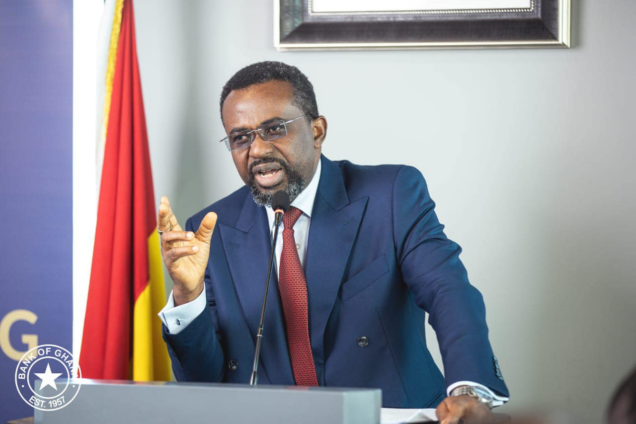adverts
The governor of the Bank of Ghana (BoG), Dr. Johnson Asiama, has acknowledged that cryptocurrency use in Ghana is now too widespread to ban, signalling a major policy shift from caution to collaboration in regulating the digital asset space.
Speaking at the Graphic Business/Stanbic Bank Breakfast Meeting on Tuesday, Dr. Asiama stated emphatically that the central bank had come to terms with the reality of crypto’s impact on Ghana’s financial ecosystem.
“Crypto is a big thing in Ghana. We can pretend to look the other way, but the reality is that it’s impacting,” he said.
adverts
For years, the BoG maintained a hands-off approach, warning the public that digital currencies like Bitcoin were not legal tender. It prohibited financial institutions from facilitating crypto transactions and issued stern notices—most recently in March 2022—urging caution.
But now, Dr. Asiama says that era is over.
“Crypto is like the air we breathe—you can’t stop it. It’s everywhere. What we must do is build systems to minimise the risks and allow innovation to flourish,” he remarked.
The central bank’s new posture comes as part of a broader effort to develop a comprehensive regulatory framework for virtual assets. Dr. Asiama confirmed that the BoG, in collaboration with the Securities and Exchange Commission (SEC), the Ghana Revenue Authority (GRA), and other institutions, is preparing to roll out regulatory structures for oversight, compliance, and consumer protection.
These efforts will be backed by the upcoming Virtual Asset Service Providers (VASP) Act, expected to be passed by September 2025. The law will empower BoG to license and supervise virtual asset service providers, enforce anti-money laundering (AML) and counter-terrorism financing (CTF) standards, and protect consumers.
Already, draft guidelines published in August 2024 have laid the groundwork, proposing obligations for registration, risk management, and secure internal systems.
Additionally, the BoG is establishing a specialised digital assets unit to monitor activity in the sector and oversee compliance.
Ghana’s move reflects broader continental and global shifts. South Africa, for example, has licensed over 240 crypto firms under its own crypto regulations, while Nigeria recently lifted its banking ban on crypto platforms in favour of new oversight guidelines.
Globally, financial watchdogs such as the Financial Action Task Force (FATF) have urged member states to implement regulations for virtual assets to prevent money laundering and financial crime. Failure to comply could result in being “grey-listed,” which would damage Ghana’s international credibility.
“We are not going in blindly. We are learning from other markets and working with experts to develop a risk-based approach that ensures innovation while keeping our financial system secure,” Dr. Asiama assured.
Though cryptocurrencies present real challenges—including price volatility, fraud, and illicit transactions—Dr. Asiama noted that they also bring substantial opportunities, particularly in the following areas:
- Innovation: Legal clarity will empower fintech startups to create blockchain-based tools for payments, lending, and value storage.
- Financial Inclusion: Digital assets can help reduce the cost of remittances and provide access to financial tools in underserved areas. Ghana received over $4.5 billion in remittances in 2023, highlighting the potential impact.
- Consumer Protection: Regulation will help reduce scams, theft, and misinformation that have plagued unregulated crypto markets.
- International Compliance: A structured framework will help Ghana meet FATF requirements, protect its financial reputation, and attract global investment.
Even as the central bank shifts its crypto stance, it continues to pilot its own Central Bank Digital Currency (CBDC)—the eCedi—designed for stable, government-backed digital payments.
Dr. Asiama’s latest comments suggest that both public and private digital currencies will play a role in Ghana’s future, but with clear rules to guide their usage.
“Our focus now is to regulate—not restrict. We are preparing the environment to ensure that innovation thrives without compromising safety, transparency, and trust,” he concluded.
Click the link Puretvonline.com | WhatsApp Channel to join the WhatsApp channel
GOT A STORY?
Contact/WhatsApp: +233243201960 or Email: manuelnkansah33@gmail.com


